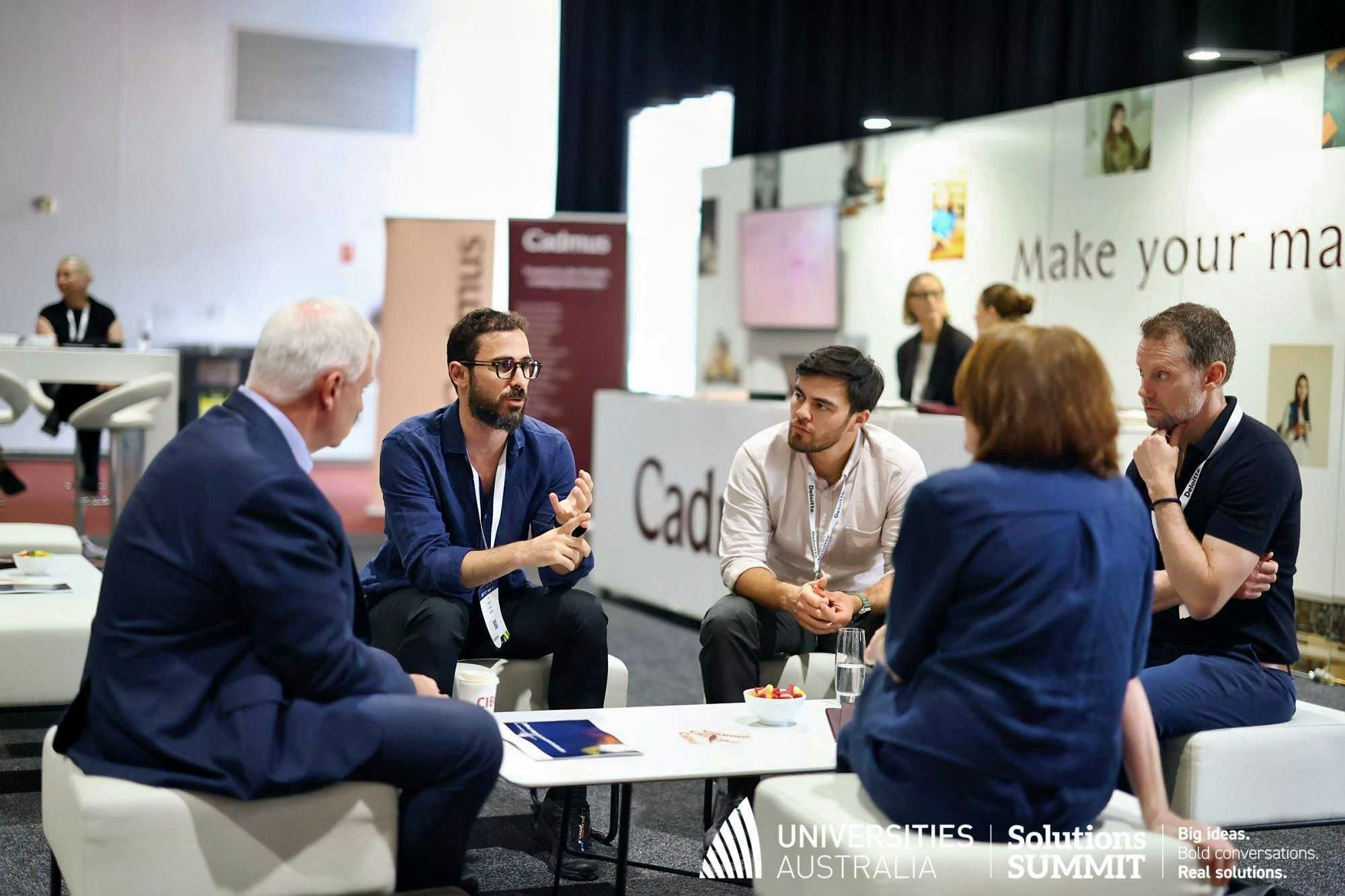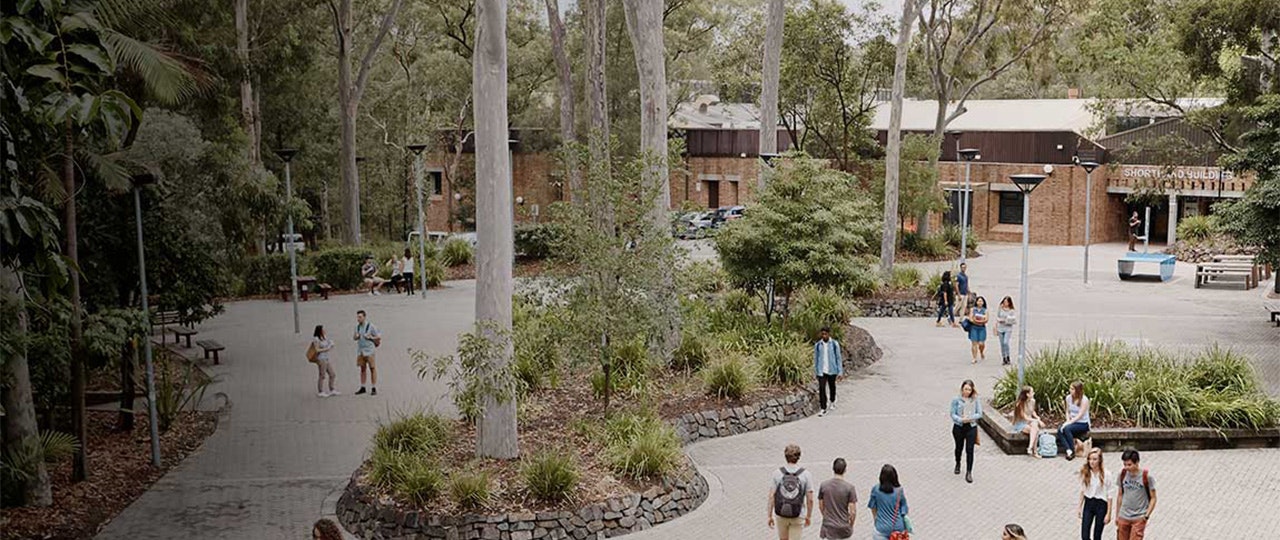News
The future of assessment in a shifting higher education landscape: Lessons from the Teaching & Learning Forum

Share with colleagues
Download the full Case Study
Take an in-depth look at how educators have used Cadmus to better deliver assessments.
When it comes to AI in higher education, one reality is clear: its presence is now part of the learning landscape.
That reality framed the conversations at the recent The University of Melbourne x Cadmus Teaching & Learning Forum, where more than 150 higher education leaders from across Australia came together to explore how universities can design for integrity, authenticity, and connection in an AI-driven world.
The day’s discussions were guided by Professor Jamie Evans, Pro Vice-Chancellor (Students and Education) at The University of Melbourne, whose moderation fostered a rich exchange of perspectives across panels, presentations, and open dialogue.
Across the forum, a clear sense of renewal emerged—universities reconsidering the purpose of assessment, how it ensures quality, and how it can more authentically reflect the human process of learning.
A Sector Moving from Reaction to Redesign
The day began with reflections from senior academic leaders, who spoke candidly about the ongoing tension between innovation and compliance. Over recent years, universities have largely been “catching up”—developing policies, tightening controls, and seeking reassurance that academic integrity can be maintained in the age of generative AI.
Now, the sector is shifting from protection to purpose. Assessment is increasingly seen not as a point of risk, but as an opportunity for renewal. Building authenticity into design, rather than relying solely on surveillance, is central to fostering genuine integrity.
This challenge spans the institution: pedagogy, technology, and policy must be aligned so that every assessment reflects both the skills universities value and the systems that support them.
Designing for Integrity, Not Policing It
A consistent thread ran through the forum—the idea of designing with integrity. Whether in policy discussions or fireside chats, speakers agreed that integrity must move beyond detection and deterrence to become a matter of capability and culture.
This shift positions integrity as something built into the learning experience, rather than something imposed after the fact. It’s about creating the conditions where ethical academic practice becomes the natural outcome of good design.
The well-known “Swiss Cheese Model” of academic integrity surfaced as a useful way to think about this layered approach. No single measure can prevent breaches; but together, they form a strong defence.
Crucially, speakers emphasised that not every assessment needs to be “secure” in the traditional sense. Instead, institutions should identify critical assurance points—those summative moments where authenticity must be guaranteed—while allowing more flexibility and creativity in other parts of the curriculum.
“If we only design for cheating, we miss the chance to design for learning.”
Technology, Policy, and Pedagogy in Partnership
A recurring theme throughout the day was the alignment of technology and pedagogy. Many institutions are pursuing large-scale assessment reforms that respond to TEQSA’s expectations, combining clear policy guidance with upgraded digital platforms—a coordinated approach in which AI-use policies and authentic assessment frameworks are implemented together, rather than in isolation.
Speakers described structured reform processes that define clear categories of AI use, ensure cross-faculty consistency, and support educators through training and exemplars.
Digital platforms such as Cadmus have become central to this work, not only by enabling secure and authentic assessment at scale, but by bringing learning design, data, and feedback into the same space.
The conversation around digital exams illustrated this well: institutions are beginning to see them not as a return to control, but as opportunities for in-place authenticity, where technology enhances both quality assurance and the student experience.
Connection in a Digital World
If the morning focused on systems and policy, the afternoon turned to something more human: connection.
In a fireside chat between Herk Kailis (Cadmus Founder & Co-Chief Executive Officer) and Alyce-Maree McGillivray (The University of Western Australia), the discussion centred on how universities can maintain authenticity and community as teaching and assessment move further into digital environments.
The paradox of AI, they suggested, is that the more digital learning becomes, the more valuable human connection becomes. The challenge now is to design technology that amplifies that connection rather than replaces it.
Cadmus’s newest products, such as Group Work, designed for transparent collaboration, and Vivas, enabling secure oral assessment—are part of this shift. They reflect a broader evolution: Cadmus is no longer simply a platform for writing tasks, but infrastructure for connected, trusted learning.
“Integrity shouldn’t be something you check at the end. It should be built into the way learning happens.”
Building for Student Success
Underlying every conversation was a shared commitment to student success. Institutions are recognising that integrity, authenticity, and success are inseparable—that designing for one inevitably strengthens the others.
Discussions on feedback, AI literacy, and capability-building highlighted how technology can reduce workload, improve consistency, and empower students to think critically about their own learning.
When assessment design, feedback systems, and policy frameworks are aligned, universities create conditions where both educators and students can thrive—and where ethical AI use becomes a natural part of academic development, not a rule to be managed.
A Collective Effort
One clear takeaway from the forum was that no institution can address the impact of AI in isolation. The changes ahead—spanning culture, policy, and pedagogy—require a coordinated, sector-wide response built on collaboration and shared learning. As universities across Australia continue to exchange insights and approaches, it’s becoming clear that the future of assessment will depend less on isolated innovation and more on developing consistent principles, shared frameworks, and ongoing dialogue across the sector.
The Teaching & Learning Forum highlighted just how valuable it is to bring people together in one room to have these conversations. Meaningful progress happens when leaders, educators, and innovators can share what’s working, challenge assumptions, and learn from each other’s experiences.
At Cadmus, we’re proud to play a part in supporting this collaborative effort—helping institutions design for integrity, authenticity, and student success. We extend our sincere thanks to all who took part in the forum, and to our partners at The University of Melbourne for co-hosting a day that fostered open discussion, practical insight, and genuine collaboration.
Thank You to Our Speakers
We would also like to warmly thank all the speakers who shared their expertise and perspectives at the Forum. Your contributions were central to making the day a rich, engaging, and thought-provoking experience for all participants.
- Alyce-Maree McGillivray, Associate Director, Digital Development and Enhancement, The University of Western Australia
- Professor Anthony Whitty, Director of the Centre for Education and Innovation, Australian Catholic University
- Professor Cate Thill, Pro Vice-Chancellor (Education), The University of Notre Dame
- Professor Christine Mathies, Pro Vice-Chancellor (Education), UNSW Sydney
- Professor David Sadler, Deputy Vice-Chancellor (Academic), The University of Notre Dame
- Professor Gregor Kennedy, Deputy Vice-Chancellor (Academic), The University of Melbourne
- Professor Jamie Evans, Pro Vice-Chancellor (Students and Education), The University of Melbourne
- Professor Jeffrey Brand, Deputy Provost (Education), Bond University
- Associate Professor Nicole Masters, Associate Dean, Learning and Teaching, University of Sunshine Coast
- Patrick Stoddart, Associate Director, Academic Systems and Digital Experience, The University of Melbourne
- Professor Phillip Dawson, Co-Director, Centre for Research in Assessment and Digital Learning, Deakin University
- Professor Rob Ellis, Pro Vice-Chancellor (Learning and Teaching), Griffith University
- Professor Sue Bennett, Deputy Vice-Chancellor (Academic), La Trobe University
- Professor Tamsin Kelly, Director Education and Student Experience, University of Canberra
- Professor Tania Broadley, Deputy Vice-Chancellor (Education), Australian Catholic University
Category
AI
Leadership
Student Success
Teaching & Learning
More News
Load more
Academic Integrity
Assessment Design
Teaching & Learning
Student Success
From bold ideas to real assessment change: What we heard at the Universities Australia Solutions Summit
Last week in Canberra, the Universities Australia Solutions Summit delivered on its promise of big ideas, bold conversations, and real solutions. These are the themes that stood out—from keynote sessions to candid conversations with university leaders across the Summit.
Cadmus
2026-03-02

Assessment Design
Company
Independent ROI analysis: What the findings mean for Universities
Independent analysis by Nous Group confirms a clear link: stronger assessment design improves student outcomes, strengthens retention, and delivers measurable financial return — with a 7.1x average ROI.
2026-02-18

Assessment Design
Leadership
Teaching & Learning
Secure assessment: From policy to practice
This article examines how Australian universities can translate assessment policy intent into sustainable practice amid growing pressures from generative AI, regulatory expectations, and equity considerations. It advocates a shift from surveillance-driven approaches toward a whole-of-institution, design-led model of academic integrity that balances secure assessment with learner-centred practice and public trust.
Cadmus
2026-02-09